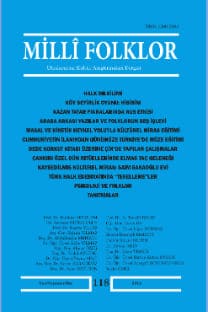Dede Korkut Kitabı ve Beowulf destanında yaşlılık ve yaşlanma
Aging and the aged in the Book of Dede Korkut and Beowulf
___
- Adil, Nevzat. "A Critical Analysis of the Theme of the Heroic Ideal in Beowulf and the Book of Dede Korkut." Yayımlanmamış Yüksek Lisans Tezi. Ankara: Hacettepe Üniversitesi, 1990.
- Bagnell, Prisca von Dorotka ve Patricia Spencer Soper. Ed. Perceptions of Aging in Literature: A Cross-Cultural Study. New York: Greenwood Press, 1989.
- Başgöz, ilhan. "Dede Korkut Destanında Epitetler." Milli Folklor 5: 37 (Bahar 1998): 23-35.
- Burrow, J. A. The Ages of Man: A Study in Medieval Witing and Thought. Oxford: Clarendon Press, 1986.
- Carruthers, Leo. "Kingship and Heroism in Beowulf. " Leo Carruthers. Ed. Heroes and Heroines in Medieval English Literature: a Festscrift Presented to Andre Crepin on the Occasion of His Sixty-Fifth Birthday. Cambridge: D. S. Brewer, 1994. 19-29.
- Chadwick, Kay Nora ve Victor Zirmunsky. Oral Epics of Central Asia. Cambridge: Cambridge UP, 1969..
- Classen, Albrect. "Old Age in the Middle Ages and the Renaissance: Also an Introduction". Old Age in the Middle Ages and the Renaissance: Interdisciplinary Approaches to a Neglected Topic. Ed. Albrecht Classen. Berlin, New 1 York: Walter de Gruyter, 2007. 1-84.
- Ergin, Muharrem. Çev.Dede Korkut Kitabı. İstanbul: Boğaziçi Yayınları, 2008.
- Fisher, Peter F. "The Trials of the Epic Hero in Beowulf." PMLA 73:3 (Haziran 1958): 171-183.
- Goodich, Michael, From Birth to Old age : the Human Life Cycle in Medieval Thought, 1250-1350. Lanham, MD: University Press of America, 1989.
- Has Hacip, Yusuf. Kutadgu Bilig. Çev. Reşid Rahmeti Arat. 3. Baskı. Ankara:Türk Tarih Kurumu Basımevi, 1985.
- Alexander, Michael. Çev. Beowulf. Harmondsworth: Penguin, 1973.
- Hendricks, Jon ve Cynthia Leedham. "Making Sense: Interpreting Historical and Cross Cultural Literature on Aging." Perceptions of Aging in Literature: A Cross-Cultural Study. Ed. Prisca von Dorotka Bagnell ve Patricia Spencer Soper. New York: Greenwood Press, 1989.1-16.
- Johnson, Paul. Ed. Old Age: From Antiquity to Post-modernity. Londra: Routledge, 1998.
- McFadden, Brian. "Sleeping After the Feast: Deathbeds, Marriage Beds and the Power Structure of Heorot" Neophilologus 84 (2000): 629-46.
- Rothauser, C.L. Britt. "Winter in Heorot: Looking at Anglo-Saxon Perceptions of Age and Kingship through the Character of Hrothgar." Old Age in the Middle Ages and the Renaissance: Interdisciplinary Approaches to a Neglected Topic. Ed., Albrecht Classen. Berlin, New York: Walter de Gruyter, 2007.103-120.
- Sak, Uğur. "Giftedness aiıd the Turkish Culture." Conceptions of Giftedness: Sociocultural Perspectives. Ed. Shane N. Phillipson and Maria McCann. New Jersey: Laurence Erbaumm Associates, 2007. 283-310.
- Sayers, D. The Song of Roland. Harmondsworth: Penguin, 1969.
- Shahar, Shulamith. Growing Old in the Middle Ages: 'winter clothes us in shadow and pain'. Londra: Routledge, 1997.
- Tunçdöken, Funda. " Dede Korkut Hikâyeleri ile Beowulf Destanı'nda Yer Alan Toplumsal Hayata Ait Motiflerin Saptanması Ve Karşılaştırılması." Yayımlanmamış Yüksek Lisans Tezi. Bursa: Uludağ Üniversitesi, 2009.
- ISSN: 1300-3984
- Yayın Aralığı: 4
- Başlangıç: 1989
- Yayıncı: Geleneksel Yayıncılık Eğitim San. Tic. Ltd. Şti.
Türk Atasözlerinde dil farkındalığı ve işlevsel dil kullanımı
Gölgesizler'de masal, efsane ve büyülü gerçekçilik
Dede Korkut Kitabı ve Beowulf destanında yaşlılık ve yaşlanma
Sözsel ve müzikal varyantlaşma: manilerin türkü içindeki dönüşümleri
Halk tıbbının kökenleri: teşhisten tedaviye din ve büyü ilişkisi
Çok mekanlı ve/veya çok mezarlı anlatı kahramanları: Yunus Emre
Karnavaldan büyülü gerçekçiliğe: Berci Kristin çöp masalları
Ali Berat ALPTEKİN, HATİCE İÇEL
Edebiyat ve ekonomi kültürel ekonomik bir alan olarak edebiyat
